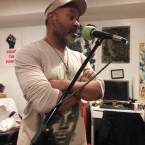Sooner or Later
Bob Ostertag
Solo. Based on a recording of a Salvadoran boy burying his father.
RecRec Music (RecDec 37) Re-issued on MVORL/Seeland in limited edition
in 2001. [Seeland 514]
Original Program Notes
The sounds in this piece come from a recording of a young boy in
El Salvador burying his father, who had been killed by the National
Guard. There is the sound of the boy's voice, the shovel digging the
grave, and a fly buzzing nearby. In Part 2, there is an additional
sound from a 3-scond sample of the guitar playing of Fred Frith.
For the most part, the recording is played back with little
electronic alteration or "processing." Rather, the music is made by
breaking the original recording into very small events, and stringing
these events into musical structures, creating shapes radically
different from the original. To use a film analogy, it is as if the
frames of a film were re-ordered so that the characters do altogether
different actions. Or you might imagine the source sounds as physical
objects viewed from different angles. I have placed you not only at
different positions around the object, but have made windows of
different sizes through which you look, and occasionally curved the
galls into lenses of various types.
The choice of sound source comes from my experiences during the
1980s, most of which I spent working in or around El Salvador. During
that time I saw a lot of death. And in that culture, which is both
Catholic and highly politicized, death gets surrounded with all kinds
of trappings that are intended to make it heroic and purposeful. Death
is explained as God's will, or as irrelevant since the dead "live on in
struggle."
But most of the 70,000 who died were simply in the wrong place
at the wrong time. They didn't want to die. There was no plan, no
glory. Of course, there are many Salvadorans who did die heroically
fighting a brutal regime against overwhelming odds. But even for the
heroes, there is a starker, more immediate side to their death.
Sooner or Later is about that side. There is a boy and his father is
dead. And no angels sang and no one was better because of it and all
that is left is this kid and the shovel digging the hole in the ground
and the fly. If we want to find beauty here, we must find it in what is
really there: the boy, the shovel, the fly. If we look closely, despite
the unbearable sadness, we will discover it. -- Bob Ostertag, 1990
Text of Source Tape
Papito chulo. !Malditos! Viendo a mi padre, siento como que en
el corazón tengo la bala, compañeros. Prefiero mejor morirme por uno
lucha justa, compañeros, y no quedar abandonado compañeros. Mi padre
decia... el combatia... era un cambatiente de este pueblo. Me decia que
yo no fuera tan despijo. Que yo fuera... tuviera una creatividad and
valor, para llegar al final de un triunfo de los compañeros que queden
or que quedemos. Ay, compañeros, yo deseo esta sangre, tarde o temprano
la voy a vengar.
Sweet Papa. Bastards! Seeing my father, I feel like I have the
bullet in my own heart, compañeros. I'd rather die for a just cause
than be left abandoned. My father told me... he was a fighter... a
fighter for our people. He told me not to be a good-for-nothing, that I
should be creative and brave until the final victory of those who
survive. Ay, compañeros, sooner or later I will avenge his blood.
Bob Ostertag
Bob Ostertag

recently listened to this again. just as devastating as the first time i heard it. beautiful considering the tragic circumstances of the source material. this is the piece that made me take notice of ostertag's brilliance and attention to detail. part one is phenomenal. part two serves a slightly different purpose, but is still quite powerful with its balancing act of tones that swing between poig...

